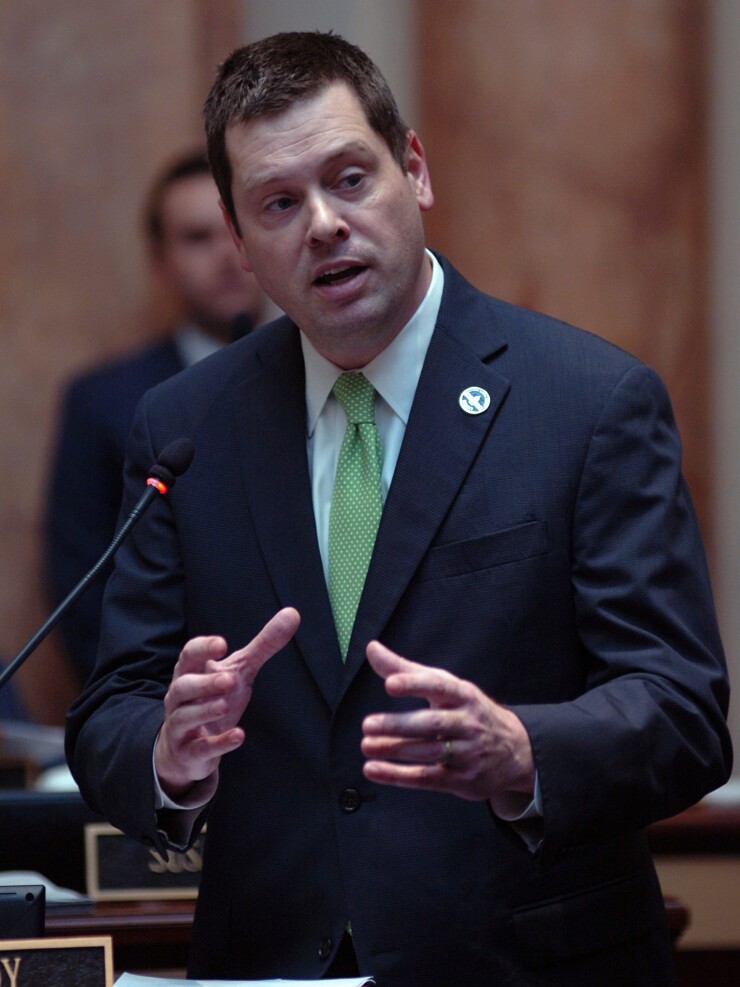Kentucky may become the first state to finance its budget and pension obligations by imposing a tax on opioid distributors.
The proposed 25-cents-per-dose opioid tax, a 50-cent per pack increase in the cigarette tax, and the suspension of incentives such as film tax credits are among a host of two-year revenue-raising measures the state House passed Thursday to support its $22.5 billion 2019-2020 budget.

House Bill 200, the general fund spending plan for the biennium, and HB 366, a 59-page revenue bill, will now be heard in the Senate.
Both bills meet the “overall theme of what the governor was committed to do” by fully funding state pensions, keeping the state ratio of debt to available revenues below 6%, and building the emergency reserve fund to at least $250 million, said Rep. Steven Rudy, R-Paducah.
“This two-year proposal reflects a strong commitment to fully fund for the first time in history our public pensions while keeping our debt service below the target mark,” said Rudy, chairman of the Appropriations and Revenue Committee. “We are making government smaller and more efficient, and that takes very hard decisions. I’m proud to present this budget to Kentucky, and I look forward to senate consideration.”
The budget includes funding for debt service on bonds for state agency and education capital needs, but a total was not immediately available.
The opioid and cigarette taxes are projected to bring in $377 million over the biennium. Other revenue-raising measures such as a new fee on tires and suspension of incentives are expected to bring in $123 million.
Kentucky's public pensions are among the worst funded in the nation.
The House’s two-year budget package increased funding for the Kentucky Retirement System by $774.5 million and the Teachers Retirement System by $89.1 million, to fully fund the actuarially required contributions for both systems at $4.8 billion.
The new revenue helped the House reestablish funding for some programs Gov. Matt Bevin proposed cutting in his $22 billion general fund budget proposal. It also allowed for increased spending for K-12 schools and prevented cuts to higher education.
The House bill kept Bevin’s proposal to reduce most state agency budgets by 6.25%, except for education, veterans affairs, and state police. Reductions are also proposed for the judicial and legislative branches, except for funding needed to fulfill constitutional duties.
Kentucky Rep. Derrick Graham, D-Frankfort, a former social studies teacher, said he voted against the budget because lawmakers balanced the plan with transfers from the health plan for public employees.
“Lord knows, as a person who’s come out of education, I’m supporting education and I try to support education each and every time,” Graham said. “But what really galls me is we’re taking funding for the health care of our public employees to try to balance this budget.”
Rep. Jerry Miller, R-Louisville, chairman of the State Government Committee, said in the future the state may benefit from other sources of new revenues. He has filed HB 229 proposing an amendment to the state constitution to allow regulated casino gambling.
“Keep in mind we have a stream of revenue we are not tapping and that is gaming,” Miller said during discussion on the budget. “We need to wake up and recognize that casinos would help the urban areas generate tax revenue to support the rest of the state.”
Under HB 229, which voters would have to approve, proceeds generated from licensing fees and taxation of casinos up until July 1, 2038 would be allocated to the state’s pension plans.
Kentucky is not the first state to consider fees or taxes on opioids, but most other states plan to use such revenue to combat overdoses and establish treatment plans.
Minnesota is debating legislation that would put a penny-a-pill fee on prescription opioids for addiction treatment and prevention programs.
New Jersey, New York, Tennessee, and West Virginia are also considering tax bills on the distribution, production, and sales of the medication, according to Bloomberg.





